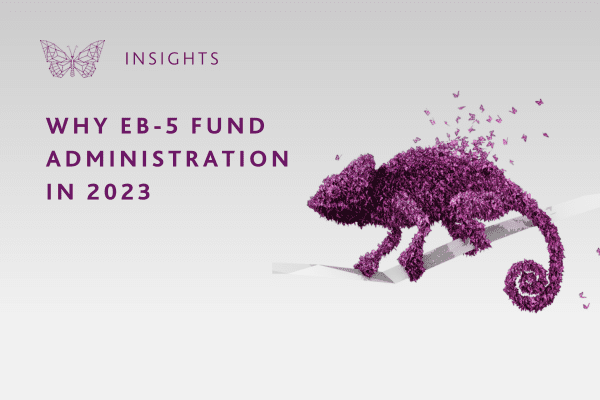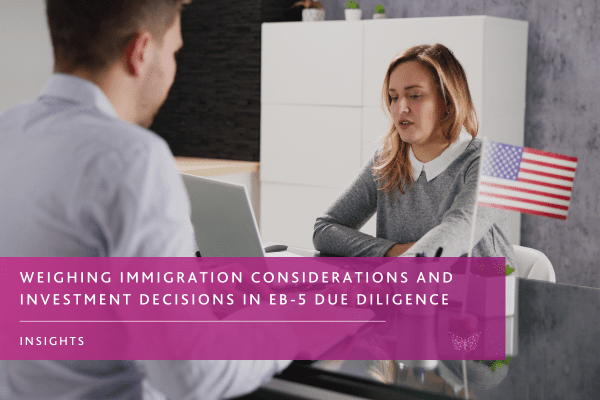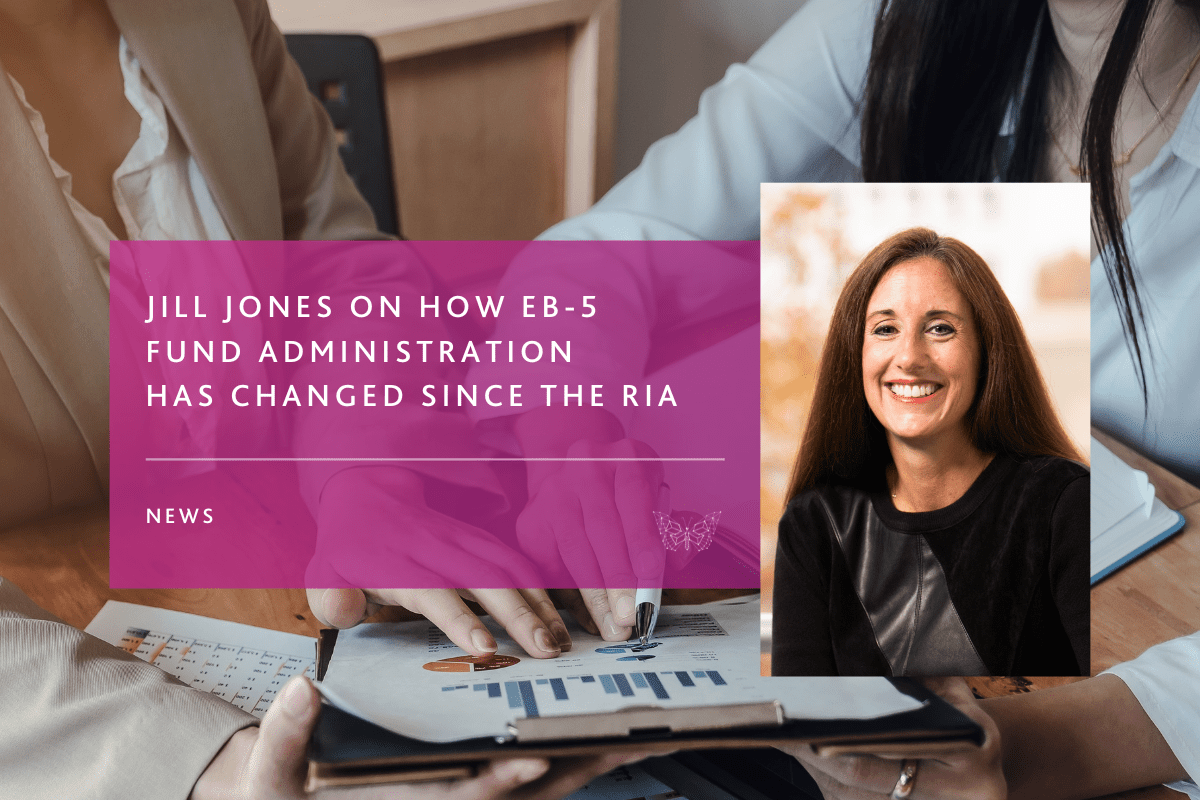The EB-5 Reform and Integrity Act provides options, but with so much still unclear, third-party fund administration is proving a safe bet.
Many in the industry were shocked earlier this year when, after the passage of the EB-5 Reform and Integrity Act of 2022, USCIS announced the deauthorization of all existing Regional Centers. Activity was halted until June 24th, when a federal court granted a preliminary injunction in the case of Behring Regional Center, LLC v. Alejandro Mayorkas, et al.
Because of this decision, for the time being, investors may file I-526 petitions. Given the go-ahead to resume activity, Regional Centers are now turning their attention to complying with the Reform and Integrity Act’s long list of new rules and integrity measures.
To better understand the implications of these new rules, JTC hosted an EB-5 webinar featuring a panel of experts helping attendees sort through some of the difficult decisions before them. One of the biggest of these decisions is the choice between an annual audit and working with a third-party fund administrator (FA). If you’ve never used a third-party FA before, how can you know which path to choose?
Sorting through the new requirements
One thing the panelists agreed on is that Regional Centers need to be prepared for the sheer amount of recordkeeping the new law requires. Rohit Kapuria, Partner at Saul Ewing Arnstein & Lehr LLP, cautioned that even those who’ve filed an old I-924 form now have to file an I-956F to demonstrate compliance with the new act, and that it’s “a complete beast of a process. We’ve not seen anything this difficult and requiring so much time and attention from USCIS in a long time.”
But as Jill Jones, General Counsel at JTC, pointed out, much of what is now required has been a best practice at JTC for years. “Investors have to be notified of the status of their investment,” she said. This level of transparency may be new and difficult for some, but thanks to JTC’s online portal, investors have access to information online 24/7.
Some elements apply to everyone, whether you elect to work with a fund administrator or not. “Everyone is required now to have recordkeeping and undergo audits,” said Jones. This refers to audits by USCIS, performed at least once every five years. Regional Centers need to file I-956 forms annually and preserve records for 5 years past the last transaction, even though it’s not clear as of this writing how “last transaction” will be defined.
Regarding this recordkeeping burden, Ronald R. Fieldstone, Partner at Saul Ewing Arnstein & Lehr LLP, warned it shouldn’t be taken lightly. “It’s maybe more than people think it is,” he said.
Another major requirement is the tracking of funds by a fund administrator. “When the money moves from an NCE account to the JCE, the request needs to be cosigned by the fund administrator,” said Jones. That’s why having a fund administrator experienced with EB-5 (like JTC) will be helpful, so you don’t have to hire different administrators for different functions.
Under the RIA, fund administration is required for each NCE except in two potential circumstances: a waiver might be issued if the NCE is controlled by or under common control of an investment adviser or broker-dealer that is registered with the Securities and Exchange Commission, or one can be issued if the NCE instead undergoes an annual GAAP audit and provides portions of the audited financial statements to DHS and the investors, but, as Kapuria noted, “we don’t exactly know what the waiver process looks like.” It’s as of yet unclear how to seek approval of a waiver or to submit those audits, meaning currently, third-party fund administration has a lot fewer unknowns.
“The act seems to be pushing the fund administration concept,” said Kapuria. But what exactly is a GAAP audit, and how does it differ from fund administration?
The difference between an annual GAAP audit and third-party fund administration
At the webinar, the participants walked through the differences between choosing to work with a third-party fund administrator and performing a yearly audit, but Fieldstone put it succinctly: “Audits are hindsight, and fund administration is a little more proactive.”
A GAAP audit is performed once a year, while third-party fund administration is done real time throughout an investment’s life cycle. So while the information being reported might be the same in many circumstances, how and when it is reported will matter to investors. As Jones pointed out, with a GAAP audit, if something goes wrong, investors won’t know about it until after the next year’s audit.
Not only is fund administration faster in identifying issues and reporting them to investors, but it can also include a lot more services. “There is a lot of work being done on a regular basis by a fund administrator,” said Reid Thomas, Chief Revenue Officer and Managing Director, JTC. “It’s very, very different than a GAAP audit.”
Some of the services a third-party administrator like JTC can provide that aren’t part of a standard GAAP audit include daily capital flow tracking and reporting over the entire project lifecycle, document storage, and comprehensive tracking and audit trail of key elements required for USCIS compliance. JTC also offers 24/7 portal access for project owners and investors, as well as a dedicated client services representative ready to assist with day-to-day operations.
The panel discussed these and other services a comprehensive EB-5 fund administration solution like the one offered by JTC can provide that go beyond what is included with an audit. However, for many NCE’s, the decision may come down to money. The first impulse might be to select an audit because it’s cheaper, even if you’re getting less – but how much cheaper is it really?
Is an audit cheaper than EB-5 fund administration?
According to Thomas, there is a widespread misconception that an audit is automatically cheaper than third-party fund administration. However, that depends on the cost of the potential audit, plus paying for the additional recordkeeping and communications required under the RIA, when compared to the cost of a comprehensive fund administration solution.
The cost of an audit will vary based upon who performs the audit and how big your fund is. This cost can be anywhere from $10,000 to $50,000 or more per audit. For that, you’ll get yearly financial reporting services, but the other recordkeeping responsibilities will still be left to you.
A third-party fund administrator can perform these same services on an ongoing basis, as well as potentially provide recordkeeping, escrow, and transaction verification. The cost will depend on which services you select, as well as how complex your fund is, but can be anywhere between 0% and 25% greater on a yearly basis than the cost of an audit.
It’s worth doing the math, because you may find the difference in cost is negligible, and with a third-party administrator like JTC, you can get not only additional services, but guidance from a partner experienced in EB-5 and best practices.
How can you choose when there’s still so much we don’t know?
For many Regional Centers, this is an easy call: they’re working with third-party fund administrators because investors want full transparency, and that’s what a company like JTC can provide. However, there’s still a lot we don’t know, and the panelists acknowledged that.
“We’re all sort of waiting to see how the agency decides it’s going to move,” said Kapuria. Further USCIS interpretations might change how we see all this, or even stop the program in its tracks. That’s why the way to provide the greatest security for investors is to have all your bases covered.
As Thomas said, while third-party fund administration and an annual audit each have benefits, “they’re really two different things, and the best practice, really, would be to do both.”
That’s not just his opinion – it’s what many in the industry are electing to do right now. “The best and most reputable Regional Centers out there are doing both of these things,” he said.
The panelists discussed other issues, including the likelihood petitions filed during this period will be grandfathered, requirements for an affiliated NCE and JCE, and what this all means for single-investor direct projects. Watch the full webinar to hear the entire third-party FA vs. annual audit discussion as well as answers to questions from attendees about other decisions Regional Centers and developers are facing right now.
Stay Connected
Stay up to date with expert insights, latest updates and exclusive content.
Discover more
Stay informed with JTC’s latest news, reports, thought leadership, and industry insights.
Let’s Bring Your Vision to Life
From 2,300 employee owners to 14,000+ clients, our journey is marked by stability and success.




















